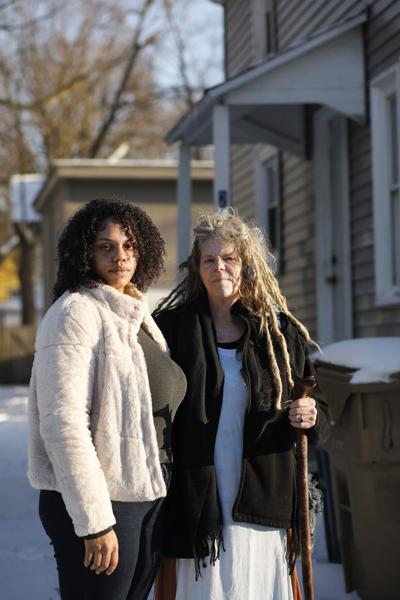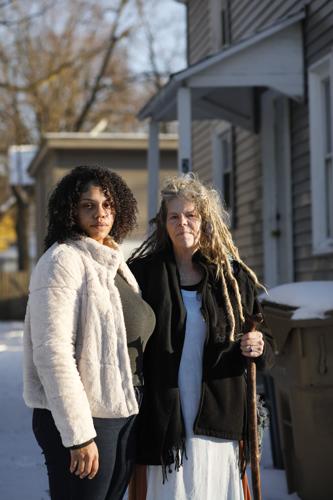An obscure Wisconsin law that allows citizens to sidestep district attorneys to force prosecution gave hope to relatives of Tony Robinson, who was killed by Madison Police Officer Matt Kenny in 2015, but the lack of clarity around its use has frustrated them again.
The long-sought lawsuit from Sharon Irwin-Henry, Robinson’s grandmother, used a rarely cited Wisconsin state statute that gives a citizen the right to ask a judge to determine probable cause for a criminal complaint if the district attorney refuses or is unable to do so.
The statute says a Wisconsin circuit judge has the authority to issue a criminal complaint if two conditions are met: “a district attorney refuses or is unavailable,” and “there is probable cause to believe that the person to be charged has committed an offense.”
Robinson, a Black man, was unarmed when he was shot and killed by Kenny in the stairwell of a Williamson Street apartment in March 2015. Dane County District Attorney Ismael Ozanne declined to charge Kenny with Robinson’s death in the months following, sparking protests across the city. He subsequently declined to review new evidence brought forth by Irwin-Henry, which included forensic analysis of the shooting.
In another blow to Robinson’s family, Dane County Circuit Court Judge Stephen Ehlke refused to proceed with the case on June 30, citing a lack of authority to appoint a special prosecutor.
“Because the local district attorney refuses, and because a judge cannot also serve as an advocate, the only potential option is to appoint a special prosecutor,” Ehlke said in his decision.
But to appoint a special prosecutor, the case must meet certain conditions, which Ehlke contends do not exist: “The problem, as I see it, arises because (the state statute) lists the circumstances in which a court may appoint a special prosecutor, and none of them apply here.”
Irwin-Henry’s legal team disagrees and says the ruling makes the state statute “completely ineffective.”
“We are disappointed with the Court’s decision to dismiss Ms. Irwin-Henry’s Petition. We disagree that the Court lacks inherent or statutory authority to appoint a special prosecutor to prosecute Matthew Kenny for the murder of Tony Robinson,” Nicholson Goetz & Otis law firm, who is representing the family, said in a statement. “The Court’s ruling effectively nullifies Wisconsin Statute 968.02(3), and Courts throughout the State have appointed special prosecutors under the same circumstances.”
Irwin-Henry plans to appeal the decision, potentially directly to the state Supreme Court to get a definitive explanation of how the law works.
“This is the system we are fighting. How is it two other judges did interpret the law, but (Ehlke) cannot?” Irwin-Henry said in an interview with the Cap Times. “Pass it along to another judge if you can't. … This man won't even take it to the first step.”
Another John Doe case
John Gross, a law professor at the University of Wisconsin and the director of the Public Defender Project, said the special statute is often called “John Doe prosecution.” States with older laws, before elected prosecutor roles existed, required their laws to allow for a direct filing of criminal complaints by a citizen.
Under those laws, a citizen can walk into the office of a judge and allege a crime, and based on their representation of the case, that judge can issue a warrant to arrest the person accused.
“You can imagine how that process could lead to abuse,” Gross said. “People could file false allegations. Many states have gotten rid of those provisions, or they're there and nobody knows about them.”
“This is something that is highly unique to Wisconsin,” Gross said.
The shorthand name “John Doe prosecution” stems from typically secret proceedings in such cases. Tony Robinson’s death, however, is not unknown. The case led to calls for police accountability and reform.
A John Doe investigation is similar to a grand jury proceeding, but instead of a jury of peers, the case is overseen by the judge. This kind of investigation was used to examine activities during Scott Walker's time as Milwaukee County executive and as governor in 2010, 2012 and 2014.
The Robinson family also pursued a federal civil rights suit against the city and Kenny over Robinson’s death, settling with the city for $3.35 million in 2017.
The terms of the settlement include no admission of wrongdoing, though the settlement at the time was the largest in state history for an officer-involved shooting. It also precludes Andrea Irwin, Robinson’s mother, from pursuing further actions against Kenny.
However, her mother, Irwin-Henry, did not take any of the money so was allowed to file the current lawsuit.
“It's all sort of superfluous in this case because we know who all the parties are,” Gross said. “The element of secrecy that was well-intentioned to protect people who were falsely accused of crimes is flipped on its head — it becomes this sinister thing where there is no transparency.”
A special prosecutor is appointed only if there is no district attorney for the municipality, if the DA is on leave or if there’s a conflict of interest between the DA and a party in the case, Gross said.
“I think they were probably trying to Hail Mary,” he said. “Their best argument was probably that there's a conflict of interest because (the DA) is being asked to prosecute a member of the police force and all district attorneys are also law enforcement officers.”
But if the judge ruled that, it would create a precedent that there always needs to be a special prosecutor if a police officer is being investigated.
While Gross said he personally might be in favor of that change, it would be “a real stretch” to interpret the statute that way.
Outdated state laws
Gross said the state’s outdated laws are to blame — statute 968.02 (3) was passed in 1969. In California, there's a law that mandates when an officer is involved in a shooting that results in death, that investigation is referred to a neighboring county’s district attorney.
“This happens again and again. When there is any type of charging decision related to a police officer and their use of force, there needs to be greater transparency,” Gross said. “These laws are not designed for this. This is not what they were written for.”
He called state statute 968.02 (3) a “relic from an earlier time” that no longer has the teeth it used to. The special prosecutor amendment even says one can be appointed if the DA is on “paternal leave,” not “parental.” And over 50 years after it was written, families like Robinson’s are still dependent on John Doe trials where decisions are made in secret without a public hearing.
“It is the opposite of getting your day in court,” Gross said. “We need an immense amount of transparency — not just about what occurred, but what is influencing the decision to charge or not to charge that individual.”
For now, he believes a better check of prosecutorial power is elections and voting for representatives who will hold parties accountable.
“If I were to talk to the family, I'd say, ‘I understand why you're frustrated, (and) I think the solution you're seeking is one that should be imposed by the Legislature,’” Gross said. “From an ethical perspective, it’s kind of a no-brainer.”
Cap Times reporter Nicholas Garton contributed to this story.







